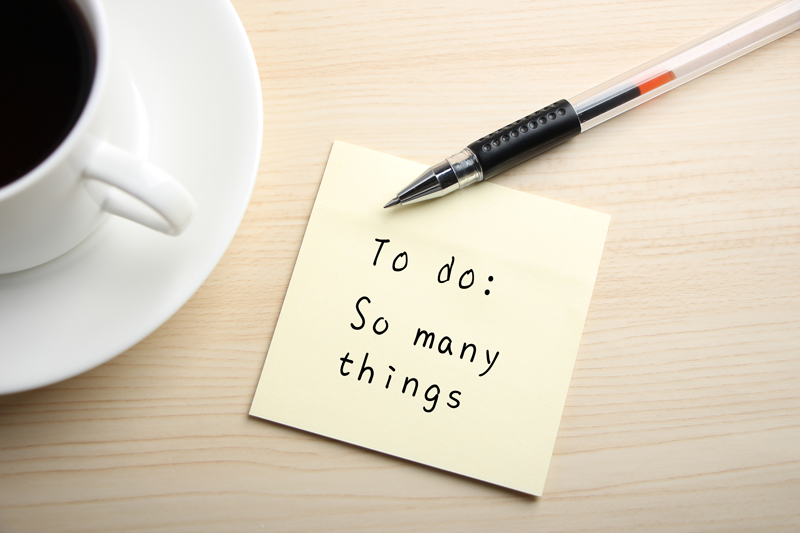
Who doesn’t have a to-do list? That familiar cascade of items which never seems to clear fully.
It sure seems that as soon as it shortens, twelve more things find their way on the end of that list (or jump to the top of it), bringing us back to square one.
It’s great to be responsible and to know I am in control of my own life. There’s a great freedom that comes with adulthood—I am not dependent on anyone else to provide me food or clothing.
No one is checking up to see if I have done my homework or brushed my teeth. My life is entirely in my control.
The Pressure of Have-Tos
However, this responsibility and independence has its downside. I find myself frequently asking myself, “What do I have to do?”
I look at my task list—which is digitally-synchronized across my devices—and often feel overwhelmed at what I see.
In an attempt to soften the overwhelm, I strategize. “OK, I can call my mom as I’m sweeping the floors.” So I call her up and grab the broom.
I am already multitasking as I sweep my way into my bedroom and see a basket full of clean laundry.
I pause the sweeping to put my clothes away, all the while half-listening to what my mom is saying, waiting for her to pause for me to interject a comment which will make it appear that I am listening.
Then she asks me about scheduling a lunch, so I leave my bedroom to get to my calendar. Next to the calendar I see a wedding invite, and I realize that I haven’t RSVP’d yet and need to do that today as well.
Oh, and it’s March. Don’t. Forget. Taxes.
The Fleeting Promise of Multitasking
When the conversation with my mom is over, I sit down to focus on preparing my annual tax documents…with the floors half-swept, the laundry half-put away, and the wedding RSVP card unsigned on the counter.
Then the feeling of overwhelm increases with a newfound urgency, because I have started and half-completed a host of tasks.
The chaos of that scene is just an example of what so many of us do every day. We are often in such a rush to get things done, focusing on the end result of having things done that we lose sight of the process.
This lack of presence leads to a much higher chance that tasks will be done incompletely or errantly.
If I am not paying attention to sweeping, I can easily miss an area of the floor, or accidentally sweep up something that isn’t trash and have that be lost for good. This inevitably leads to greater problems down the road, because I’ll be accountable for a potentially preventable mistake that I made.
I am not alone in getting great satisfaction in crossing something off my to-do list. Yet that satisfaction is fleeting, as the newest top priority is now staring me in the face, and the pressure to complete that task immediately evident.
So the cycle continues.
Unitasking
What if I approached that same list in a more mindful way?
I call my mom and sit down as we speak. In a mindful phone call, I can relate far better with her. I hear what she is saying, and am able to respond.
On some level, it’s clear to her that I am listening to her and responding with presence. The benefit for her, and for our relationship, is immeasurable.
After I get off the phone, I turn to sweep. As this is the only task I am working on. I am very mindful about where the broom is going, what areas of the floor I have gotten and haven’t.
Focusing only on sweeping, I’m free to notice my wife’s missing earring on the floor. I find a natural rhythm with the broom and enjoy the process.
The process of being mindful is applicable to any task. When performing a task, make that the only thing you are doing.
How Are You Spending Your Life?
Completing these tasks is going to take a certain amount of time regardless. I can choose to rush through four things simultaneously, doing them all with divided attention, stressing along the way, for that momentary satisfaction of crossing them off my list.
Of the finite amount of time I am here on this earth, in this case I am choosing to spend a portion of it in stress completing the task for that momentary satisfaction of having completed it.
Instead, if I approach my tasks with mindfulness and bring presence to what I’m doing, my time on earth is suddenly more enjoyable and far less stressful. On top of this, I still have the satisfaction of crossing the item off my to-do list.
I invite you to consider how you’re approaching the things that you have to do. Can you bring a sense of mindfulness to them?
Start with the very next task you are going to complete, whether it’s reading an article, eating a meal, or walking to your car. What does it feel like to do only that task?



This is so needed in today’s world. Thank you
Thank you Sharon!
Thanks for the thoughtful & interesting articles you publish. They are always enlightening. This was a great one!! I can really relate. It gave me pause to rethink how I handle the overwhelming tasks that I deal with everyday. I took the mini course & appreciate your daily follow-up. I look forward to it daily– especially the “pictures of the day” Thanks again.
Thanks for your comment Barbara! It’s amazing how much benefit we can receive when we incorporate mindfulness into our lives. Keep up the good work!
Just what i needed for today. I understand mundfulness and practice it. ..but not with my to-do list.
You explained it so well.
That’s so great Cydney! Thank you! Here’s to broadening the reach of mindfulness in your life.
I almost didn’t read this as I often feel overwhelmed with my to do list so I don’t even start. Thank you for providing another perspective, much needed today
I’m so glad. It is so easy to feel overwhelmed. I’m reminded of the saying “a little progress each day adds up to big results.” No one can complete all the tasks on their list simultaneously. One at a time.
I try to do this in a work environment so as not to leave important jobs half done or worse. I’m viewed upon as strange because I appear reluctant to start a new task before I’ve finished my current one. Then the nagging starts ‘have you done that yet?’ ‘How long will you be?’ – if only they realised by multi tasking they prolong their own stress and frustration as well as mine!
Yes! We often fly in the face of cultural conditioning when we do this. The feedback you’re getting is a great sign you’re on the right path. I’m reminded of the adage that people judge what they don’t understand. Thank you so much for your comment!